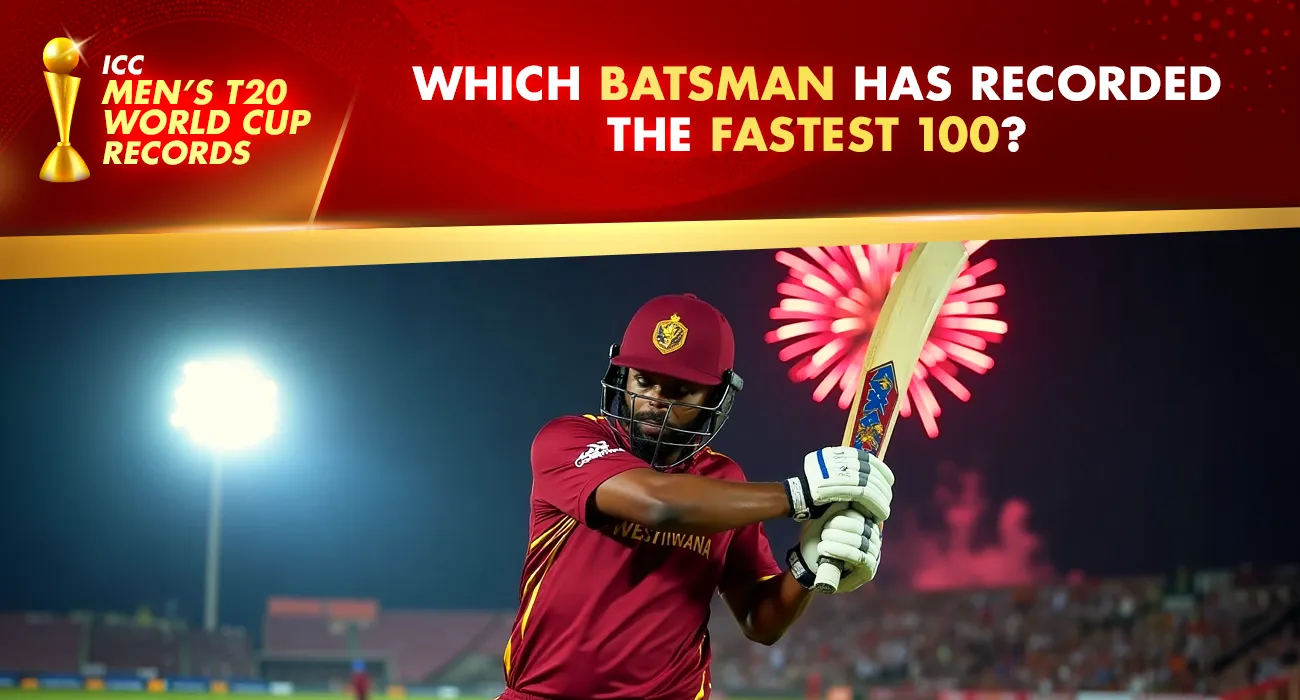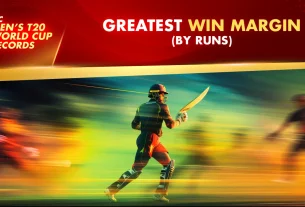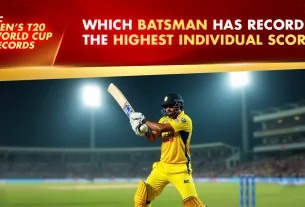ICC Men’s T20 World Cup Records: Fastest 100 Runs
The pinnacle of cricket’s shortest format, the ICC Men’s T20 World Cup, is where batters shine with incredible performances. Among these accomplishments, reaching a century in a short period is a sign of exceptional talent, strength, and control. Fast hundreds thrill the crowd in T20 cricket and turn the tide of a match. This blog pays homage to the players who have left their mark on cricket history by highlighting the fastest hundreds in the history of the T20 World Cup.
| Rank | Balls | Player | Opposition |
| 1 | 47 | Chris Gayle | England |
| 2 | 50 | South Africa | |
| 3 | 51 | Brendon McCullum | Bangladesh |
| 4 | 52 | Rilee Rossouw | |
| 5 | 58 | Ahmed Shehzad |
Chris Gayle (West Indies) – 47 Balls vs England (2016)
Chris Gayle, the “Universe Boss,” is the fastest century man in T20 World Cup history. On March 16, 2016, Gayle smashed a century off just 47 balls against England at Mumbai’s Wankhede Stadium.
With 11 sixes and five fours, Gayle sent the bowlers flying to all sides of the field in this power-hitting masterclass. With his undefeated hundred, he helped the West Indies defeat 183 and set the stage for their great campaign, culminating with winning the trophy.
Chris Gayle (West Indies) – 50 Balls vs South Africa (2007)
South Africa demonstrated their batting ability in the first T20 World Cup in 2007 by scoring a century off just 50 balls. Although the individual’s name isn’t included in this particular record, the innings happened on September 11, 2007, at Johannesburg’s Wanderers Stadium.
T20 cricket was still a relatively new format at the time, but this performance showed how explosive it can be. The blazing knock left opponents and fans in amazement at a pivotal point in the competition.
Brendon McCullum (New Zealand) – 51 Balls vs Bangladesh (2012)
On September 21, 2012, at Pallekele, Sri Lanka, Brendon McCullum, one of the biggest pioneers of T20 cricket, struck an incredible 123 off 58 balls against Bangladesh. He combined aggression and skill to get his hundred in just 51 balls.
With 11 fours and seven sixes in his innings, McCullum destroyed the Bangladeshi bowling assault. This knock, which is still among the highest individual scores in T20 World Cup history, is evidence of McCullum’s innovative style of play.
Rilee Rossouw (South Africa) – 52 Balls vs Bangladesh (2022)
Rilee Rossouw demonstrated clean, deliberate hitting on October 27, 2022, at the Sydney Cricket Ground when he made a century from 52 balls against Bangladesh. With eight sixes and seven fours in his 109-run innings, he helped lead South Africa to a dominant total.
Rossouw’s tremendous worth to the squad was demonstrated by his ability to sustain a high strike rate while constructing significant innings. This strike strengthened South Africa’s standing as one of the T20 World Cup’s most potent batting lineups.
Ahmed Shehzad (Pakistan) – 58 Balls vs Bangladesh (2014)
At the Sher-e-Bangla National Stadium in Mirpur on March 30, 2014, Ahmed Shehzad’s 58-ball century versus Bangladesh was a batting clinic. In the T20 World Cup history, his 111 not out is still Pakistan’s lone century. Shehzad’s innings were marked by his clean hitting and gap-picking skills, with five sixes and ten fours interspersed throughout his incredible effort. His ability as a match-winner was demonstrated during that pivotal innings, a performance that remains celebrated by cricket enthusiasts and is often discussed on the best betting sites in India for its impact on the game.
In the ICC Men’s T20 World Cup, fast hundreds are the height of batting supremacy. These efforts, which range from Ahmed Shehzad’s cool 58-ball knock to Chris Gayle’s explosive 47-ball century, perfectly capture the changing art of T20 cricket. These records encourage upcoming generations to push the limits of what is feasible in the shortest format as the game develops further. The next fiery century, which will write another chapter in T20 cricket history, is eagerly anticipated by fans.
Also read: Football Betting Outcomes – Impact of Weather in 2025






